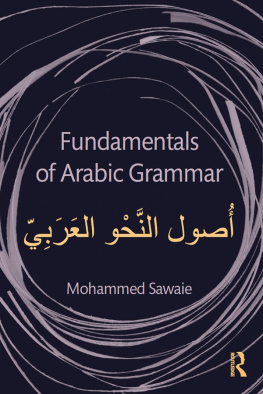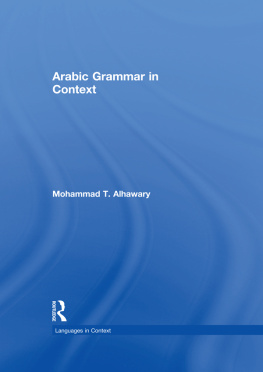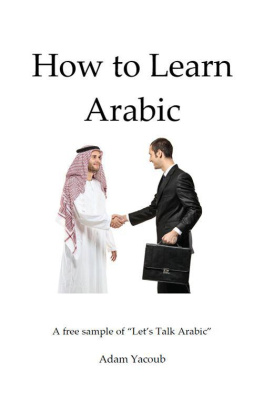Learn Lebanese Arabic in 30 Minutes JK STYLES Published by Book Branch, 2017.
While every precaution has been taken in the preparation of this book, the publisher assumes no responsibility for errors or omissions, or for damages resulting from the use of the information contained herein. LEARN LEBANESE ARABIC IN 30 MINUTES First edition. January 18, 2017. Copyright 2017 JK STYLES. ISBN: 978-1386960744 Written by JK STYLES. 10 9 8 7 6 5 4 3 2 1
Table of Contents
Welcome
# There are more than 300 million Arabic speakers in the world Arabic is the official language of the 22 countries that form the Arab League.
There are more than 300 million Arabic speakers across the world, though they predominantly live in the region stretching across the Middle East and North Africa. It is also one of the six official languages of the United Nations (UN). Yet, in the UK, only one per cent of the adult population can hold a basic conversation in Arabic. # Each region has its own spoken variety, and they are massively different There's the Modern Standard Arabic ("MSA"), which is more or less uniform across all the Arab countries in books, newspapers, documents and solemn speeches, but each region has its own spoken variety, and they are massively different. Arabic is almost at a point at which the Latin language was in the tenth century or so, when it started to split to French, Italian, Catalan, Spanish, Galician and other Romance languages. # Arabic is also an official language in several countries that don't have an Arab majority In addition to being the official language in all the Arab countries, it is also an official language in several countries that don't have an Arab majority: Chad, Comoros, Djibouti, Eritrea and Israel. # Arabic is also an official language in several countries that don't have an Arab majority In addition to being the official language in all the Arab countries, it is also an official language in several countries that don't have an Arab majority: Chad, Comoros, Djibouti, Eritrea and Israel.
It is also one of the six official languages of the United Nations. Because of how central it is to Islam, Arabic words can be found in languages spoken by all Muslims, far beyond the Arab countries. Arabic words can be found in many non-Arabic languages of Africa, like Swahili; in Turkish and other Turkic languages like Azeri, Tatar, Kazakh and Uzbek; in Persian, Pashto and other languages of Iran and Afghanistan; in Urdu, Punjabi and many languages of India; and even as far as Malaysian and Indonesian. But before you start your adventure, how about understanding the Arabic language in the quickest way possible?
Introduction
The Lebanese dialect of Arabic is similar to that spoken in Syria, Jordan and the Palestinian Territories, somewhat different to that spoken in Egypt, and very different to other forms of Arabic. As with all dialects of Arabic, the dialect is a spoken language only; the written language always conforms to standard Arabic. Arabic is significantly different from English: different forms are used when addressing males, females and groups; plurals and verb conjugations are highly irregular and difficult to figure out from their roots; and the pronunciation includes some very difficult sounds.
Lebanese, luckily, is a much-simplified from standard Arabic, and should not be overly difficult for the traveler. Learning some basic Lebanese Arabic dialect expressions could always come in handy; however, knowing either English or French should be enough for a tourist visiting Lebanon, since many Lebanese people (especially the youth, particularly in Beirut) are trilingual.
Pronunciation guide
For some Arabic sounds, there is no easy transliteration (and no single agreed transliteration). The pronunciation guide shown below is case sensitive; for example, 'th' is a different sound to 'Th' and 'TH'. Note that there is no such things as a diphthong in Arabic; instead, some consonants map to English diphthongs.
Vowels
a like 'a' in "apple" i like 'ee' in "cheese" u like 'oo' in "too" o like 'o' in "more" e like 'e' in "bed" like 'ai' in "claire"
Easy Consonants
b like 'b' in "bed" t like 't' in "top" j like 's' in "pleasure" kh like 'ch' in Scottish "loch" (or German "nach") d like 'd' in "mad" r like 'r' in "row" z like 'z' in "haze" s like 's' in "sing" sh like 'sh' in "sheep" f like 'f' in "fun" k like 'k' in "kitten" l like 'l' in "love" m like 'm' in "mother" n like 'n' in "nice" h like 'h' in "help" w like 'w' in "weight" y like 'y' in "yes"
Difficult Consonants
The following 3 consonants are pronounced by rounding the mouth as you say them.
You can get an approximate effect by accentuating them in the following pronunciations. S like 's' in "sorry" D like 'd' in "dot" T like 't' in "taught" The following consonant is almost never pronounced in the Lebanese Arabic dialect but replaced with a glottal stop, which can also be represented by an apostrophe. q in regular arabic : like 'c' in "call" (with the back of the throat) gh like a French or German letter "r" The following consonant (called "ha", which will be represented by the number 7), is similar to English "h" but stronger. It is pronounced deep in the throat, like the sound you make when breathing on a pair of glasses to clean them. a little like a mixture of "h" and "kh" a glottal stop (IPA: ), or the constriction of the throat as between the syllables uh-oh, but in Arabic this is often found in strange places such as the beginning of a word. Known in Arabic as hamza The following consonant (called "ayn", which we will be represented by the number 3), is very difficult to say.
In English, the only time you will use the throat muscles used to say this letter is when you are throwing up; if that's how it feels, you're probably doing it right. like the sound represented by "aargh"
Phrase list
Some commonly understood Lebanese Arabic dialect phrases use either French or English words; these have been shown in quotes below to avoid confusion.
Basics (Kalimt Asesiy)
Hello. mar7aba Welcome! ahla w sahla (Lebanese people use also the French (bienvenue) or the English terms or they say just "ahlan" How are you? kifak (male), kifik (female) (I'm) fine. Mni7 (Male) - Mni7a (Female)(Lebanese people also say l 7amdella, literally: "thank God") Well (health) bikher, tamem Good mni7(m) mni7a(f) Excellent be jannin (it's excellent) or bjannin (I'm excellent) And you? w enta (male), w ent (female) Blessed l 7amdella What is your name? shoo esmak? (m), shoo esmik? (f) My name is ______ . esm ______ .
Nice to meet you. Tsharrafna How old are you? add 3omrak? (m) add 3omrik? (f) Please. Eza bet reed (m), eza bet reedeh (f) (literally : if you please). Also, 3mol ma3roof (m), 3mele ma3roff (f). Proper : La-w sama7et (m), la-w sama7teh (f) (literally : only if you allow it) (Lebanese people use also the English term : please) Thank you. ahla w sahla (it will be enough to say just "ahla") If God wills (or used as 'hopefully') eza alla rad Really? Walla or 3anjad Yes. eh or na3am No. la2 Maybe yemkin Excuse me. (getting attention) ma twekhezne Excuse me. (begging pardon) "pardon" (French is used here) I'm sorry. "sorry" (English is used here) or Be3tezeer (I excuse myself) Goodbye (Go with peace) (formal) Ma3el salm Goodbye (informal) "bye" (English is used here) I don't speak Arabic [well]. ma be7k 3arab [mni7] Do you speak English? bte7k englize? or you can just say it in english Is there someone here who speaks English? fi 7adan hon bye7ke inglize? Help me! se3doon Okay tayib/okay/meshe Look out! oo3a or ntebih (male) ntebh (female) For sure/Of course! akeed! Good morning. ma be7k 3arab [mni7] Do you speak English? bte7k englize? or you can just say it in english Is there someone here who speaks English? fi 7adan hon bye7ke inglize? Help me! se3doon Okay tayib/okay/meshe Look out! oo3a or ntebih (male) ntebh (female) For sure/Of course! akeed! Good morning.








